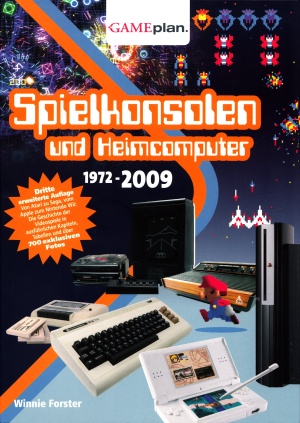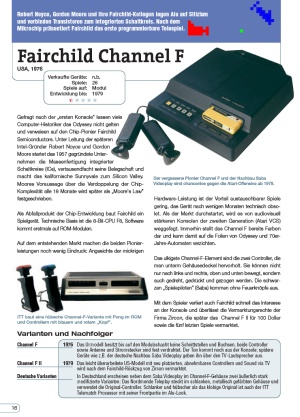
Video Game Book Reviews
Winnie Forster's Spielkonsolen und Heimcomputer is hands down the most complete compendium of gaming machines you'll find in printed form. It covers not only dedicated consoles, but also many home computers that were not designed for gaming, but of course became thoroughly "abused" for the "pastime" nonetheless. Each entry comes with the most important data for a device; units sold, number of available games, storage media, release and discontinuation dates, as well as a somewhat untransparent 5-star evaluation of the overall variety and quality of the games library. The short to medium-sized rundown of the system's history, important games and description of the hardware is composed in the dry writing of an encyclopedia, which is what this ultimately strives to be. Neat is the table at the end of most entries, which lists updates and variations with their individual peculiarities.
Inside the scope of the compendium are home consoles, home computers and dedicated gaming handhelds, whereas arcade machines, mobile phones with game capabilities (with the exception of the N-Gage) and non-programmable single game / compilation devices like the '70s Pong consoles or LCD handhelds are not covered in detail, but briefly taken account for in the history 2-pagers, that are interspersed in between. There's even a neat overview for the different magnetic, optical and electronic storage media games are and used to be played on, and also the appendix which compares technical specs of same-generation machines in a handy table.
What more could one wish for? The book being in a language one can read, for example. The second edition, dubbed Game.Machines, was actually published in English in 2005, but it is out of print, with used copies usually going for very steep prices. But even the listing price for the current edition with EUR27.80 isn't exactly cheap for a 200-something pages paperback, since Gameplan is basically just Winnie Forster's do-it-yourself publishing company and books in Germany are generally quite expensive. It is not too difficult to make out what each field of data means whithout being able to read much German, but reading text body requires decent language proficiency. The new one is mostly an update with some errors fixed and the new consoles released since 2005 included, though, so you're not missing too much if you should be able to track down a copy of the English edition. The first edition, released in 2002, on the other hand, is about a hundred pages shorter, still with significant gaps.
But even in its 3rd edition, Spielkonsolen und Heimcomputer is not quite perfect. For overseas readers, the eurocentric view becomes immediately obvious when they try to find the Magnavox Odyssey II, which is only listed as the Philips G7000, with a passing mention of its origin in the text body. Then there are full entries for the X68000 and FM-Towns (both 2 pages), while Japan's 16-bit home computer No. 1 is delegated to the far end of the book as a 2-paragraph stub, alongside obscurities like the Dragon 32 and Gizmondo. Of course one can't hope for every single mega-obscure device to find its way into the book, either, so those interested in Soviet home computers or the Taiwanese 16-bit console Super A'can have to turn to the internet for their fix.
A few other decisions seem dubious no matter which way you look at them. Six pages for the GBA? Is the platform really as interesting or important as the MSX or the PS2? And can the Mark III and Master System really be filed as "variations" of Sega's SG-1000? Because they're backwards compatible? Then why is the PS2 not a variation of the PSX? Other than these minor flaws in composition, of course it's quite impossible to compile that much data without a bunch of errors slipping in, which the official homepage has a sizeable list of corrections for.
Gameplan also carries several other, mostly encyclopedic books: Joysticks looks exclusively at various game controllers on 144 pages, Lexikon der Computer- und Video-Spielmacher is a reference of companies and personalities, and probably the least penetrable for non-German speakers, but only because Volkscomputer is just a slightly expanded translation of Commodore: A Company on the Edge by Brian Bagnall.
Update 06/01/2013: Since this review, Gameplan has produced a new English Edition called Game Machines 1972-2012 - The Encyclopedia of Consoles, Handhelds and Home Computers.

